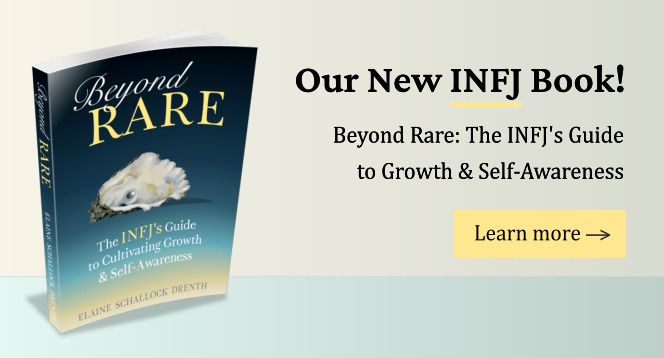
By Cheryl Florus
As feeling types who are naturally attuned to picking up on other people’s emotions, it may come as a surprise that INFJs aren’t always as in tune with their own. That is not to say that they don’t experience their emotions, on the contrary. They just don’t have a system in place to process them efficiently and thus experience them in a controlled fashion.
INFJ Emotions
What makes their emotions so difficult to handle at times is the relative lack of an introverted judging function in the INFJ’s function stack which is able to actively organize their emotions and thus provide a clear overview. The introverted judging function the INFJ has available to do the job is Introverted Thinking (Ti). Aside from the fact that using Ti to organize and process emotions is like using a fork to comb your hair, Ti is INFJ’s tertiary function. This means that it operates less consciously and less efficiently than if it were one of the top two functions. As a result, the INFJs may have a hard time putting their emotions in perspective and keeping them under control.
But which role does the INFJ’s Introverted Intuition (Ni) play in this, one may ask? Being an introverted perceiving function which connects the data present in the inner world, why not use Ni to put the INFJ’s own emotions in perspective? Ni internally perceives and discerns a pattern only in data that the extraverted perceiving function (Se) transports inwardly, mostly data related to the emotional state of others (Fe). This makes Ni virtually blind to the INFJ’s own emotions. Furthermore, as it’s not a judging function, Ni cannot actively modify and organize abstract data residing in the inner world, whether they be emotions or other information, just passively observe the relationships that exist between them.
But by knowing this very fact, it is possible to create ways to indirectly make INFJ’s emotions visible to Ni. As I mentioned before, Ni processes data that Se provides. So all the INFJ has to do is find a way to get their emotions in the outside sensory world and feed it to Se. This can be done by writing them down and reading them again. But another, and more effective, way of doing this is by saying out loud what she is feeling and hearing herself talk. Even better would be telling someone what she is feeling, and letting the other person (preferably someone with a dominant or auxiliary Fe) reflect in their own words what has been said, as if to check if he/she understands it correctly. What will happen next is the INFJ will automatically use her Se to sense emotional (Fe) data that she has provided herself, in her own words, or the words of the other person, and therefore gaining insight into her emotions in an indirect way. This is why INFJ’s generally feel better after talking to someone about their feelings, especially a feeling type who uses Fe with some proficiency.
The thing is, though, that because INFJ’s emotions seem to internally flow in random directions because of a lack of an inner structure, sometimes drifting to the surface of consciousness, other times sinking to the bottoms of the subconscious again, the emotions that the INFJ will likely feel the need to talk about are the ones that are visible on the surface of consciousness at that particular moment. This means that not all feelings about a particular subject will likely be expressed in one conversation, simply because she doesn’t have access to all of them at that moment. So in reality, this means that it takes many conversations to get everything out. And even then, other new emotions will always be generated, meaning that the INFJ will have to repeat this process of outwardly expressing their emotions indefinitely, either on her own or with someone else. This can be with a confidant of her choice, but also with a psychotherapist.
Learn more about INFJs—their personality, relationships, life struggles, paths to growth, and much more—in our new INFJ book:
Beyond Rare: The INFJ’s Guide to Growth & Self-Awareness

Samantha says
Wow. This article explained something I have always sensed and only recently began to articulate. A total sense of disconnection with my own emotional and experiences. Thank you so much for sharing this. You are doing a world of good in helping us understand ourselves better.
Jill says
I am actually near tears. This explains my opus moderani to me thoroughly. It makes complete sense and further gives excellent coping strategies.
Cory says
Exactly.
Sam says
Great! However, why do you assume the INFJ to be a “she”?
Male INFJ here!
Gail says
I’m married to a male INFJ. I’m an ESFP. The fact that we are direct opposites works well. It’s just hard for me (esfp) to be unselfish when I’m married to an INFJ who cares about the feelings of others. I care about me first and he’s the opposite. I’ve tried putting myself last but I feel fake and insincere. ESFP struggle is real.
Chris Bair says
I love the article, but i agree with sam. I would very much apprieciate it if you used non-assumptuious pronouns such as they, them, their (etc.)
M says
Same… Plenty of INFJ guys…
Cory says
I cried when I read this. I feel like my world has never made so much sense. Thus is my problem exactly, thank you. I’m going to have my SO read this so he can understand.
Cory says
Ugh, *this
Brenda says
Thank you for this.
Carol Enman says
How can I deal with this nagging feeling that I am not living to my fullest potential. I feel like I am suppose to help other, and change something on a small or large scale but, I am so bogged down with everyday life and helping those around me and huddling responsibilities…I get off track…but I am screaming inside from lack of creativity and fighting this need to make a difference
Debbie says
Yes. Exactly.
Crystal says
I was wondering if anyone could answer me this, If most of my emotional turmoil that needs to be sorted out comes from disagreements with my boyfriend (INTJ) with my mother(INFJ) and sister(ENFJ) as my confidants how can I show them that I am with the right man for me if they only hear about the problems I encounter with him? My boyfriend is getting better at allowing me to express my emotions so that I can sort them out but this often does not fully sort things out as I do not want to express certain emotions with him that would completely overwhelm his rational mind. As in my emotions do not equal any sort of logical foundation or my own beliefs. My mother and sister they do not like my boyfriend for me because it is hard for them to trust my reasoning over my emotional outpouring over his limited number of shortcomings. I have been with him for seven years and they still do not think that he is good for me. I really hate my extroverted feeling. Why do I have to express my feelings and put them onto others so that I can order them within myself? I can do so much within myself but the one thing that provides my own stability has to be expressed first?
Becca Snow says
I am just gonna say that nobody should be with someone who makes them hate part of themselves. (Your extroverted feeling) you deserve to be fully accepted as you are. I’ll be praying for you.
David says
Great, helpful article. However as an infj male the wording does tend to kind of forget us. I’m sure it’s not intentional.
Mistri says
I have to echo the responses already hear. Just reading this post, gives me relief and explains so much.
Ed says
:) You know… women aren’t the only ones who want to save the world. By the way all of the article i read here are excellent. I’m 25 yr old INFJ with loads of baggage and experience. I’m majoring in cognitive or research psychology, whichever comes first. I love the fact that everything is based in scientific data. We wouldn’t be here if we didn’t like it, we just need something to tease about.
Ed says
Here’s an interesting study for you ;) an INFJ who is majoring in psychology but entered into a broken foster care system in their developmental phase at age 10 after prior developmental trauma.
Becca Snow says
Hi, I’m an ENFP trying to help my INFJ best friend with this. Any suggestions?